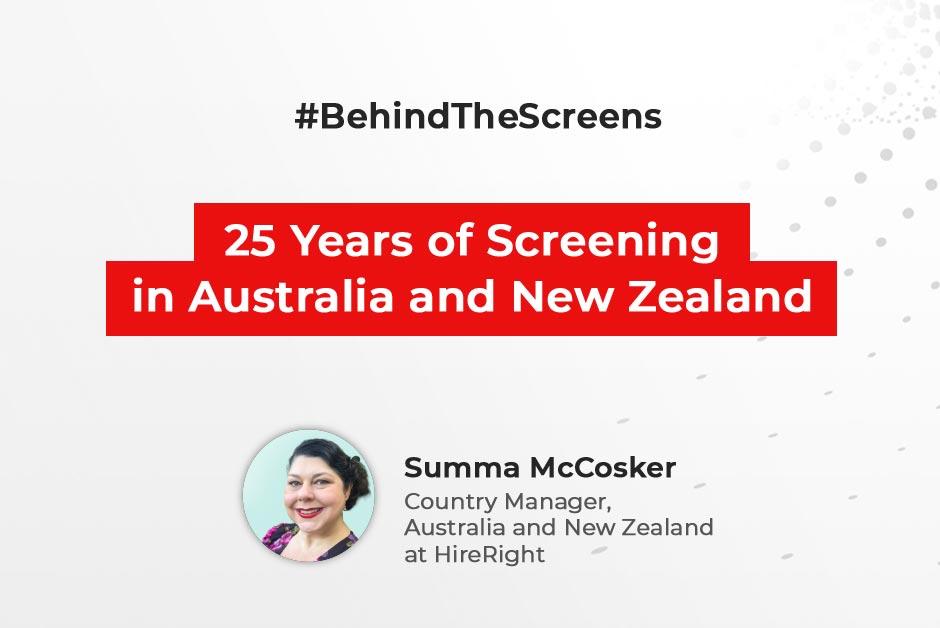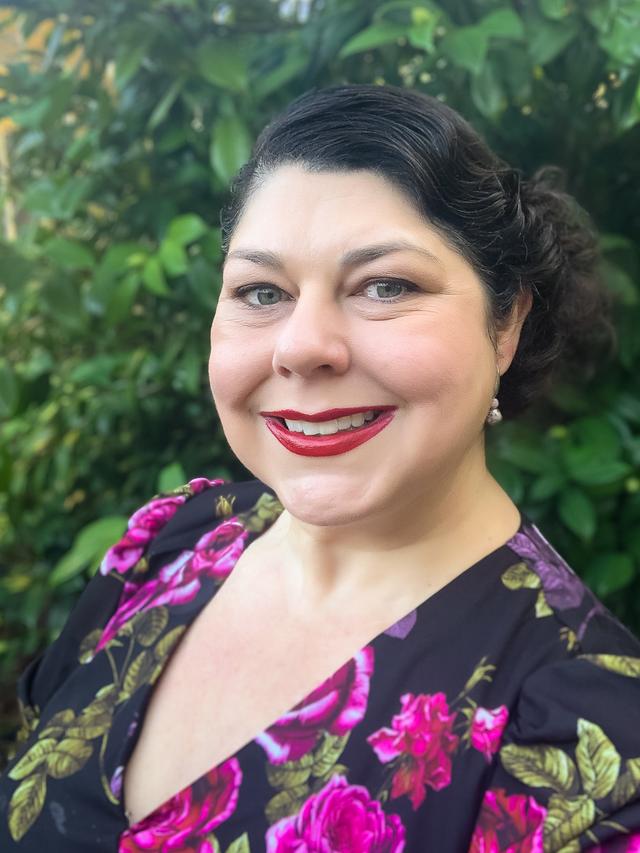#BehindTheScreens: 25 Years of Screening in Australia and New Zealand
In this blog, we go behind the screens with Summa McCosker, HireRight’s Country Manager for Australia and New Zealand.

Background screening has become an essential part of the hiring process for organizations around the globe, helping to ensure that they are making informed decisions about who they bring into their workplaces. It’s hard to imagine a time when there were little to no resources available for employers to help keep their workplaces safe and mitigate risk.
Summa McCosker, HireRight’s Country Manager for Australia and New Zealand has been a leading figure in the background screening industry for 25 years. She is a founding member of the APAC Council at the Professional Background Screening Association (PBSA)—formerly the National Association of Professional Background Screeners (NAPBS)—and has been an active participant in PBSA activities for over a decade, including sitting on the Board of Directors. She has built a background screening company from the ground up and continues to share her extensive experience and keen insights of the industry in the Australia and New Zealand (ANZ) region. To commemorate her remarkable career, we talked to Summa to get her insights into the ANZ background screening landscape.
How did you get started in the background screening industry?
In 1998, I graduated with a degree in Criminology and began my career as a research assistant. In that role, I was supporting fraud investigators and conducting background screening for colleagues in the UK and the U.S. Early in my career, while I was managing a team of researchers, I was asked to choose between an investigative role and one focused on background screening. Well, I chose background screening and I have never looked back! I continued my work with consulting firms and background screening companies, developing a deep understanding of the emerging industry, and a passion for customer service, which most background screening companies were missing. By that point, I had over eight years of experience in the Australian market and decided to put it to best use by starting my own screening business, PeopleCheck, in 2006. While the competition focused on competitive pricing and offering niche screenings, I took PeopleCheck in a different direction. I wanted to help customers understand what they needed to consider when hiring to reduce risk for their businesses. This, combined with extraordinary customer service, is what set PeopleCheck apart from other providers. PeopleCheck was acquired by HireRight in 2019, and I remain committed to helping businesses make informed hiring decisions by providing them with the guidance and support they need. I am now a Country Manager for HireRight, managing the ANZ region.
What is background screening like in the ANZ? How has it changed over the years?
The ANZ background screening market has come a long way in the last 25 years! When I first started in the industry, most organisations would undertake a couple of reference checks, but in general, screening was almost unheard of. Organisations would rely on referrals and traditional interviews, completed in house. Record keeping in ANZ has always been fairly structured and in some kind of electronic format (think microfiche!), which works for us given the geographical size of our countries and relatively small populations. Sources used for background screening are usually online and easily accessible, provided you know where to find them and have the right consents and reasons for access. For example, our criminal records are nationally searched and stored in one central database. Additionally, employers and educational institutes are required by law to retain certain records for specific time periods, which makes verifications far more straightforward than in other parts of the world.
The landscape really started to shift in 2001 after the events of September 11, which put the global spotlight on security in general. That same year, Australia saw the introduction of the Financial Services Reform Act, which made it mandatory for financial planners to be screened. Since then, background screening has grown in its acceptance and is now utilized by a variety of industries. That said, not all industries have embraced screening. In some sectors, many employers still think that a reference check is enough. There is still enormous growth and education potential in the region.
How is background screening different here compared with the rest of the world?
Australia is a regulated country with labour laws and privacy legislation well established, along with strict compliance and legislation across several industries. I think most of the world witnessed Australia’s strict, government-led response to the COVID pandemic, which for the most part, we diligently followed as citizens. Recommendations from Royal Commissions (also known as a public inquiry) in recent years have seen requirements for background screening and public safety increase considerably, with some recommendations now law. Workers in industries such as financial services, transport, education, mining and construction, and government—as well as those in roles working with children, vulnerable people, and the elderly—often require varying degrees of background screening.
What are some unique challenges regarding background screening employers face in ANZ?
In Australia, we have multiple avenues to source criminal checks, with the two most recognised through the Australian Federal Police (AFP) and the Australian Criminal Intelligence Commission (ACIC). The source is the same, but there are some key differences between the two methodologies they each use. ACIC is most widely used in Australia – by Australian organisations on Australian citizens or permanent residents. ACIC is quicker and cheaper because it is direct to source often through an integration. However, the ID requirements and customer set up can be a roadblock for some organisations when using ACIC. Candidates are required to provide four pieces of ID and linkage to their ID. The AFP is a great option for organisations needing Australian criminal checks for candidates that are not based in Australia. The 100-point ID requirements are easier for non-Australians to meet, but the cost of the check and turnaround times are greater as the AFP acts as a middle agency to the source. The substantial ID requirements, particularly for ACIC, can be hard for customers and applicants to understand.
Another challenge we have is our privacy laws and legal framework that underpins background screening, especially in Australia. This matters as Australians and Kiwis love to travel, so checking credentials abroad is a key part of any background check for many candidates. When there is conflict between laws and the treatment of personal data, it can be challenging. Here are the key challenges we face in region:
Whilst our privacy laws have been well established in Australia for decades, the influence of the General Data Protection Regulation (GDPR) globally is proving challenging for us to operate across multiple jurisdictions. Despite being a well-developed country, Australia does not yet have adequacy in the eyes of the GDPR (New Zealand does), and while there are similarities between the two pieces of regulation, it is the differences that are glaring. For example, there is no recognition of a data controller or processor in Australian data protection legislation. There are plans to update our privacy laws to be more aligned to the GDPR, but the proposed reforms will cover only some of the differences.
Much like other developing background screening regions, influences of background screening have come from more developed markets, such as the U.S. We have seen firsthand global economies expanding and investing in companies down under, bringing with them global policies, such as background screening. With the U.S. background screening industry governed by the Fair Credit Reporting Act (FCRA), this can often also lead to an expectation of screening standards that may apply in the U.S., yet not in local regions such as Australia and New Zealand.
Still on the topic of global screening, screening outside Australia can sometimes be a challenge for us in ANZ due to our physical location in the world. For the U.S., we are a day ahead and for EMEA we are a workday ahead. This means timing is everything! Unless you are a part of a global screening provider, it can mean potential delays, with lots of late night and early morning calls to tie up a background check.
Why are more businesses in ANZ screening these days?
The short answer is because they have to. More and more industries are now requiring background screening on their employees as a government requirement or recommendation. Many federal agencies require background screening for their employees. As stated above, the financial services industry is heavily regulated. Many organisations who provide healthcare, social assistance, or care for children also require some type of background screening.
Global influences also have a huge impact on screening in ANZ. The U.S. has a robust screening industry, and many other regions are taking note and following by example. HireRight is seeing more and more customers looking for a provider that can service their global business, as well as candidates that have a global footprint. At the same time, they want local geographic and industry knowledge, with on the ground support, not only in Australia and New Zealand, but also in the US, India, Philippines and other major locations where they do business or are looking to expand.
However, the biggest reason why more customers are screening their employees is they have a genuine desire to protect their employees, their company, and the community. Knowing who you hire is essential. Global influences, federal mandates, and competition lead to discussions about screening employees, but it has proven to be a crucial business decision over the decades since I started in the industry.
If you would like to learn more about background screening in Australia and New Zealand, please visit HireRight.com
Release Date: December 12, 2023

Summa McCosker
Summa grew PeopleCheck in Australia from a start-up micro-business to a highly successful enterprise with a strong, well-known, and respected brand and industry reputation. The growth of PeopleCheck led to the acquisition by HireRight in October 2019 and Summa continues to oversee Australian and New Zealand operations within the HireRight family. Summa is responsible for building local service delivery, developing local product expertise and knowledge, enhancing customer relationships, and driving HireRight’s growth in the local region. Summa works collaboratively and strategically with the broader HireRight teams, bringing global initiatives into local ANZ operations. Summa was a founding member of the APAC Council and has been an active participant in PBSA activities spanning more than a decade. In addition to her current role on the PBSA Board, Summa is currently involved with the Global Learning Centre, Australian Committee and the APAC Education Committee. Summa’s previous roles include member and Chair of the APAC Council and the Global Taskforce. Summa has been in the screening industry since 1998 and has extensive experience in the Australasian and broader APAC regions and markets. Summa previously worked for PricewaterhouseCoopers for six years and RISQ Group before establishing PeopleCheck in 2006. She holds a Master of Criminology from the University of Sydney and a Bachelor of Social Science from the University of Western Sydney.